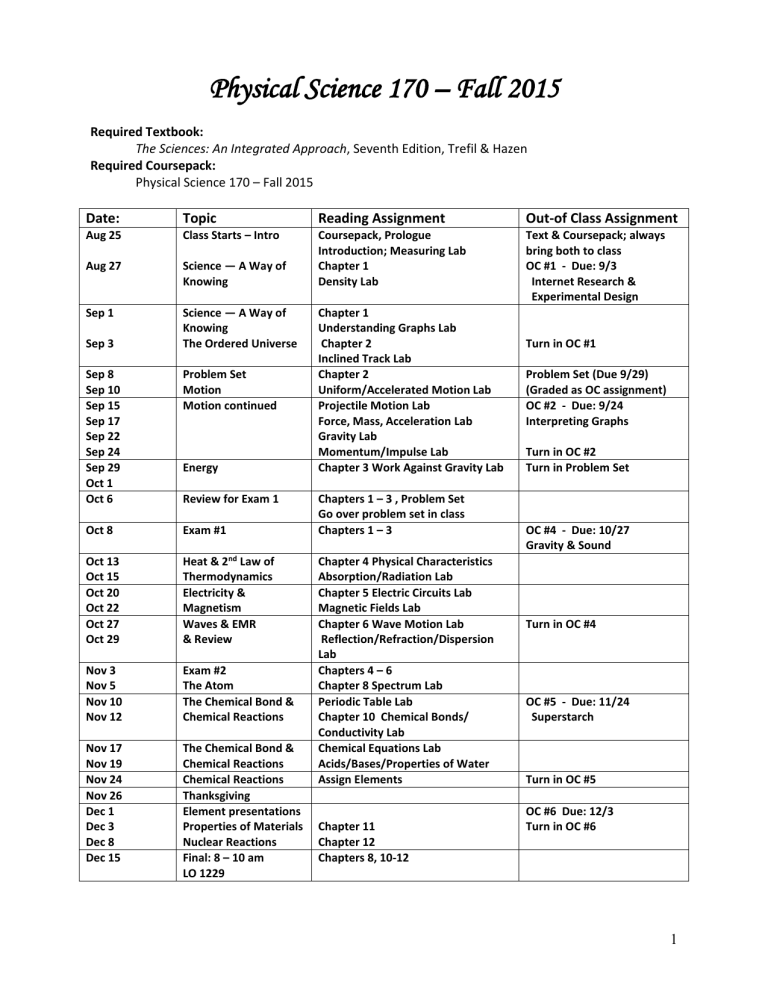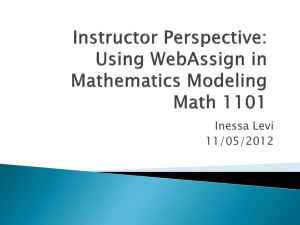16215 PS 170 Physical Science Davis 1229 TR 0900-1040

Physical Science 170 – Fall 2015
Nov 3
Nov 5
Nov 10
Nov 12
Nov 17
Nov 19
Nov 24
Nov 26
Dec 1
Dec 3
Dec 8
Dec 15
Required Textbook:
The Sciences: An Integrated Approach, Seventh Edition, Trefil & Hazen
Required Coursepack:
Physical Science 170 – Fall 2015
Date:
Aug 25
Aug 27
Sep 1
Sep 3
Sep 8
Sep 10
Sep 15
Sep 17
Sep 22
Sep 24
Sep 29
Oct 1
Oct 6
Oct 8
Topic
Class Starts – Intro
Science — A Way of
Knowing
Science — A Way of
Knowing
The Ordered Universe
Problem Set
Motion
Motion continued
Energy
Review for Exam 1
Exam #1
Reading Assignment
Coursepack, Prologue
Introduction; Measuring Lab
Chapter 1
Density Lab
Chapter 1
Understanding Graphs Lab
Chapter 2
Inclined Track Lab
Chapter 2
Uniform/Accelerated Motion Lab
Projectile Motion Lab
Force, Mass, Acceleration Lab
Gravity Lab
Momentum/Impulse Lab
Chapter 3 Work Against Gravity Lab
Chapters 1 – 3 , Problem Set
Go over problem set in class
Chapters 1 – 3
Out-of Class Assignment
Text & Coursepack; always bring both to class
OC #1 - Due: 9/3
Internet Research &
Experimental Design
Turn in OC #1
Problem Set (Due 9/29)
(Graded as OC assignment)
OC #2 - Due: 9/24
Interpreting Graphs
Turn in OC #2
Turn in Problem Set
OC #4 - Due: 10/27
Gravity & Sound
Oct 13
Oct 15
Oct 20
Oct 22
Oct 27
Oct 29
Heat & 2 nd Law of
Thermodynamics
Electricity &
Magnetism
Waves & EMR
& Review
Exam #2
The Atom
The Chemical Bond &
Chemical Reactions
The Chemical Bond &
Chemical Reactions
Chemical Reactions
Thanksgiving
Element presentations
Properties of Materials
Nuclear Reactions
Final: 8 – 10 am
LO 1229
Chapter 4 Physical Characteristics
Absorption/Radiation Lab
Chapter 5 Electric Circuits Lab
Magnetic Fields Lab
Chapter 6 Wave Motion Lab
Reflection/Refraction/Dispersion
Lab
Chapters 4 – 6
Chapter 8 Spectrum Lab
Periodic Table Lab
Chapter 10 Chemical Bonds/
Conductivity Lab
Chemical Equations Lab
Acids/Bases/Properties of Water
Assign Elements
Chapter 11
Chapter 12
Chapters 8, 10-12
Turn in OC #4
OC #5 - Due: 11/24
Superstarch
Turn in OC #5
OC #6 Due: 12/3
Turn in OC #6
1
Instructor Information:
George Davis
E-mail: george.davis@csun.edu
Office Hours: 8 am – 9 am TTh
Or by appointment--Live Oak Hall, 1220
"We live in a society exquisitely dependent on science and technology, in which hardly anyone knows anything about science and technology." - Carl Sagan
Evaluation and Grading:
You will earn a grade in this course that directly relates to the:
mastery of the course content as reflected in daily quiz and exam scores
quality and quantity of the work you do on the in-class exercises
quality and quantity of your work on out-of-class assignments & homework
Grades will be assigned on the basis of the percentage of total possible points that you accumulate over the semester. Points will be allocated in approximately the following manner:
25 in-class quizzes: 125 points
5 out-of-class assignments: 100 points
Midterms (2) and final exams: 350 points
________________________________________________________________________________________________________
Total: 545 points
Extra credit is applied at the end of the semester
Grading scale (straight percentage – no curve):
>91% A
90-91% A-
88 – 89% B+
82 – 87% B
80 – 81% B-
77 – 79% C+
69 – 76% C
67 – 68% C-
65 – 66% D+
58 – 64% D
50 – 57% D-
<50%F
Daily Quizzes:
Daily quizzes are given the first 5-10 minutes of each class period and CANNOT BE MADE UP. The quizzes generally relate to the reading assignment and will cover material in the previous class activity. Concepts encountered more than once in previous class meetings may appear on more than one quiz. The two lowest quiz
scores will be dropped. It is not possible to do well in this class if you do not take the daily quizzes – it is in your best interests to arrive at class on time and be prepared for the quiz.
Out-of-Class Assignments:
An out-of-class assignment will be due approximately every two weeks, some more often, some further apart. It is not possible to do well in the class if you do not complete the OC assignments.
Out-of-class assignments require you to do research and/or perform experiments outside of class. Each assignment has a series of questions that you must answer. Assignments that include experiments will have data tables, calculations, and diagrams, all of which must be completed.
It is your responsibility to review the assignment when it is assigned and to ask questions about any part of the calculations; ask the instructor as soon as possible so that you have sufficient time to complete the assignment.
OC assignments are graded on the following basis:
Completion –When doing calculations and conversions, show all your work. Credit will not be given for answers that do not show the work. Many assignments have multiple parts such as calculations, questions, and diagrams after the experiment has been conducted. Be sure you complete all parts of the assignment.
Demonstrate comprehension of the concepts and scientific principles – This is evaluated by your answers to the ‘thought’ questions.
Experimental Procedures – When you collect and record data, be sure to complete the data tables properly, including the correct units of measure, rounding, and significant figures.
Problem Solving – Problems may include math problems, word problems, and ‘thought’ problems.
Answers may require calculations, research, and thought.
Independent Work – Some experiments require you to work in groups to conduct the experiment and collect the data. Every other part of the assignment must be done individually, there are no ‘group’
2
papers accepted. Each person must complete their own data tables, perform their own calculations, and answer their own questions. Copying is not allowed and copied or group papers will not be graded.
Neatness – If I can’t read it or I can’t find it – I can’t grade it. All OC assignments should be completed neatly on note paper and stapled in the upper left corner. Your full name and class must appear on the first page. Answers to questions should be numbered. All data table and calculations must be shown.
Attach any diagrams, graphs, or data tables at the back of the assignment.
In-Class Assignments:
In-class exercises will be collected periodically throughout the semester as assigned at the end of each chapter. Most of your time in class will be spent working on in-class group exercises. It is expected that you will have completed all parts of each in-class exercise.
Late Assignments:
NO late assignments will be accepted except for those that result from a medical/legal emergency affecting you or a close family member. Such an emergency will have to be documented in writing by an appropriate medical/legal authority.
Exams:
There will be two midterm exams and a final. Exams are not comprehensive, rather they will cover material introduced in the first, second, and third part of the semester, respectively.
Extra Credit:
Extra credit assignments may be available during the course of the semester. Extra credit assignments will be graded the way out-of-class exercises are graded. These points must be earned.
If You Miss A Class Meeting:
You are responsible for obtaining all missed materials, not the instructor.
Dropping:
Read the Schedule of Classes. If you decide that you don’t want to continue with this course, you must drop the class – you will not be dropped automatically if you simply stop showing up.
“Incomplete,” Withdrawal from the Course, Change of Grade:
The Department Chair insists the faculty adhere to the “incomplete” and “withdrawal” policies and deadlines published in the Schedule of Classes (online).
Academic Dishonesty:
I adhere to the University’s policy on academic dishonesty. Read the Schedule of
Classes. Cheating will result in the assignment of a zero for the exam and notification to the Dean of Students which may result in disciplinary action.
Always Bring to Class:
Your textbook
Your class notes
Calculator: A simple calculator that does square roots and that can handle exponents (usually an EE or EXP button) is required. These are inexpensive and are available at the bookstore or any office supply store.
A protractor: 6-inch or smaller
A 12-inch English/metric ruler: inches in 1/16
At least 4 colored pencils
Graph paper 10 squares per inch th and centimeters in mm’s
Electronic Equipment:
Please turn off all electronic equipment (cell phone, Ipod, etc.) before coming to class.
No text messaging during class. If seen, you will be asked to leave.
Note: During tests, you will turn off your cell phones and place them in your packs, purses, or some other location where they are inaccessible.
Other Key Points:
It is the responsibility of each student in this course to know and follow written guidance give by the instructor in this class.
Except for the final date and time, I reserve the right to alter these policies and schedules as conditions warrant.
3





